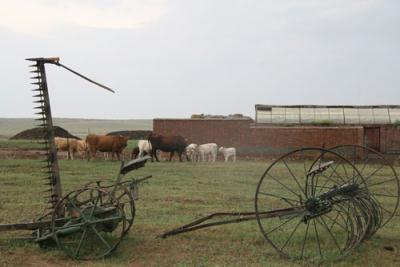Ashley Diary- Xilinhot a city with big plans
2009-08-27 15:21 BJT
By Ashley Eldridge
Xilinhot, the capital of the meng (league) comprising Erlianhot and Xiwuqi, among others, is a city with big plans. We stopped there for the night en route to Xiwuqi, a small town that will play host to the annual sporting competition over the next three days, and were immediately impressed by the overall cleanliness of the city. Projects are in the works everywhere - new apartments are going up all over town while most existing buildings only look to be at half occupancy. A new showpiece museum with eye-catching Mongolian statues was just completed across from the government headquarters. A modern retirement complex for impoverished senior citizens is under construction, and brand name stores line the city's wide avenues.
 |
We met with Zhang Guohua, the head of the meng, at his office, where he told us of the problems facing Xilinhot as it develops. In the past, the grazing land was split into pieces and each family was responsible for their own plot of land. Now the herdsmen have learned to combine their land to produce better results, but the threat of desertification as a result of overgrazing is already a reality. New, hardier breeds of cattle have been introduced to withstand the harsh Mongolian winters, and the government now provides feed and shelter to ensure the livestock make it through the coldest months. After several years of using the more nutritious feed and new breeds, Zhang said the herdsmen have begun asking for the better products on their own. In cases where locals can be educated directly, rather than through practical application, training programs are available to prepare them for jobs in factories, mines, or as drivers.
Managers are needed to run the factories, especially the high-tech ones, and a dearth of local talent has forced the government to look outward and recruit experienced executives with high salary incentives. Several world-class mining facilities in the area provide the funding to recruit them, and the city has begun training its own students in local colleges, where courses are offered solely based on local needs.

 Mail
Mail Share
Share Print
Print


 Video
Video









 2009 China Central Television. All Rights Reserved
2009 China Central Television. All Rights Reserved